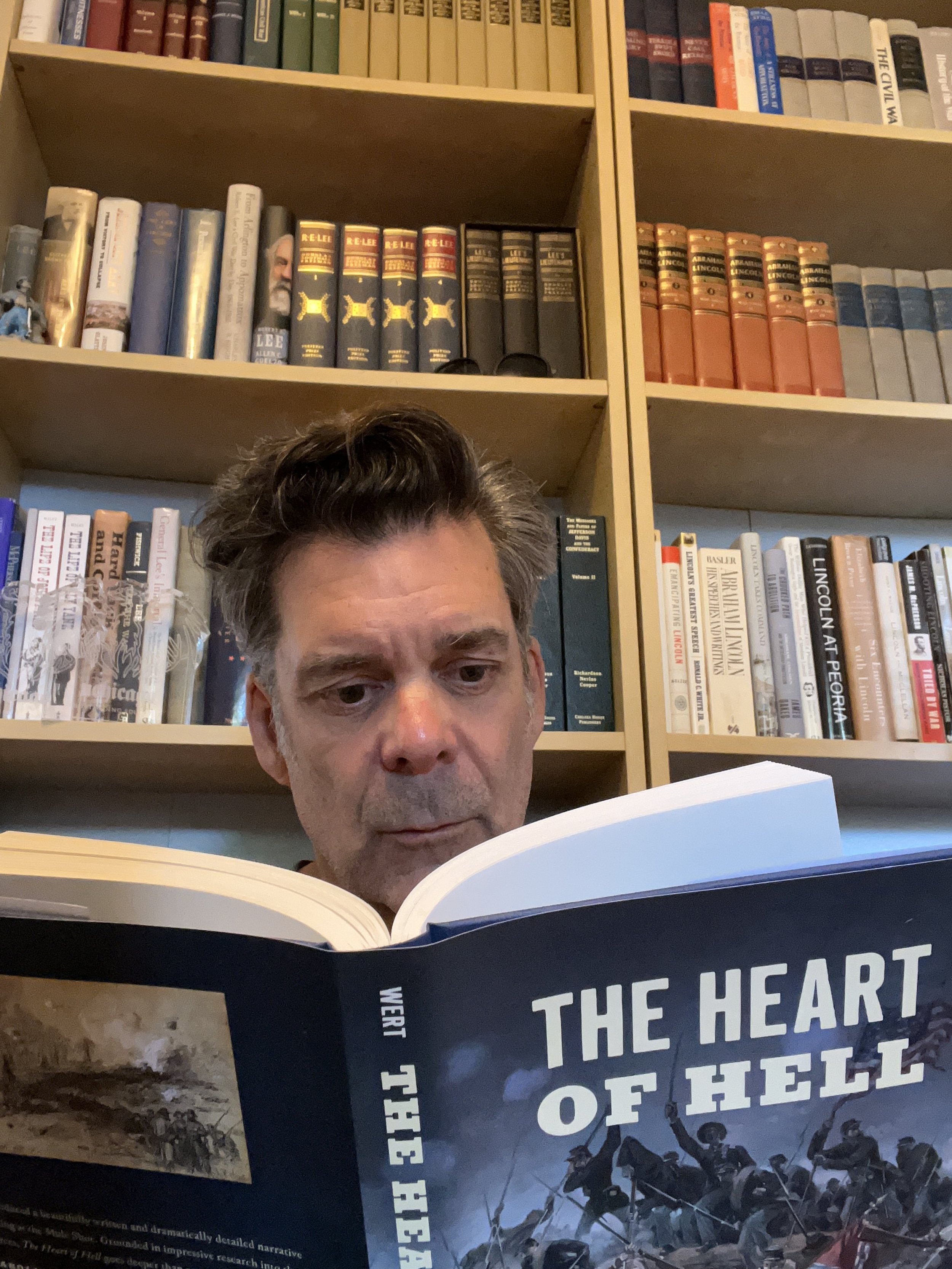The Heart of Hell - Soldiers and Spotsylvania
Jeffry D. Wert The Heart of Hell: The Soldiers’ Struggle for Spotsylvania’s Bloody Angle (UNC Press, 2022).
I frequently assign soldiers’ letters and diaries and veterans’ accounts to my Civil War students - I have found that this is a perfect way to get first-hand insights into any number of subjects: cause, motivation, religious beliefs, politics, ideology, weather, disease, boredom, irritations typical of soldiers, trivial anecdotes, amusing stories…all sorts of things.
Conspicuously absent in many soldiers’ accounts are descriptions of their experiences in or the aftermath of battle. It might be safe to assume (as more than a few combat veterans have assured me) that they didn’t write much about combat because first, they probably didn’t want the families to worry and second, because battle is hard to understand for someone who has not experienced it themselves. The same often holds true for post-war accounts. Veterans’ testimony (given in speech form or through various writing endeavors) also tended to be devoid of the grimmest details of combat.
But…from time to time, those who did the fighting in the Civil War, both during the conflict and after the fact, tried their best with words to convey to the uninitiated their experiences in battle.
With these exceptional examples in mind, I am thankful for this book - Wert has mined the archives to find a number of examples of written testimony. I mean, when I come across these jewels in the special collections departments around the country I am super stoked - so the fact that we have a collection gathered into one fairly concise book is pretty awesome. In short, Wert’s book gets to the heart of soldiers’ opinions on the matter: Spotsylvania was Hell…as it were.
Just to wet your beaks a little…here are a couple of riveting examples…
First, from a Union veterans’ account published in 1914:
The grimiest figure it is possible to conceive of the soldiers fighting here. The men stood in red mud up to their ankles; their clothing was dripping moisture; their shoulders, arms and faces were smeared with the plastic red soil which attached itself to the musket butt every time the gun was loaded. Their lips were blackened and parched from biting cartridges to release the powder. They fought without food or drink or any thought of it. (150)
Second, a Pennsylvania lieutenant describing the scene of carnage shortly after the battle:
(The dead were) two, three and four deep, tangled-up with each other bodies and limbs intertwined, actual heaps of dead. (180)
Third, a South Carolina soldier’s post-battle description for a Charleston newspaper:
The ground in front was carpeted with Yankee dead, and our trenches filled with our own dead - very few wounded. I was splashed over the brains and blood. In stooping down or squatting to load, the mud blood and brains mingled, would reach up to my waist, and my head and face were covered or spotted with the horrid paint. The Yankees would charge up against our lines, made up from a ditch about two feet deep, stick their guns over and fire. We, in turn, rose up and fired as they retreated, and generally with good effect. Officers and men say that such fighting was never seen before. (167)
I want my students to read these descriptions, not because I am a fan of gratuitous carnage (I assure you I am not…), but because I find that these vivid descriptions help challenge the romanticized aspects of combat depicted in patriotic Civil War era whoop-dee-do and post-war commemorative accounts of heroism. In this book, the war and all its trappings: the fear, suffering, misery - become all real.
The Heart of Hell gets the wheels turning on lots of other subjects too, such as the culture of caution in the Army of the Potomac that Ulysses S. Grant essentially had to undo. Wert has his reader contemplating the changing nature of war of attrition, sans the set piece battles of 1862 and 1863, rather focusing on digging in, perhaps even foreshadowing the trench warfare of the next century’s Great War. It leads one to think seriously about the definitions and origins of a so-called “hard war.”
And that’s not all. Wert makes one consider the role of the press - and how the printing of letters from the battlefield most certainly affected morale at home. He peers into the dedication to cause…though the armies were bloodied, neither broke - and the war dragged on, even after unparalleled bloodletting. If you think about it, this really shows the commitment of the majority of the men in the ranks.
Suffice it to say I highly recommend this book - and as I have taken quite an interest in the Overland Campaign of late, this volume was especially welcome. It is a wonderfully written focused account of a few of the most troubling days in 1864, and one you really need to read.
With compliments,
Keith

